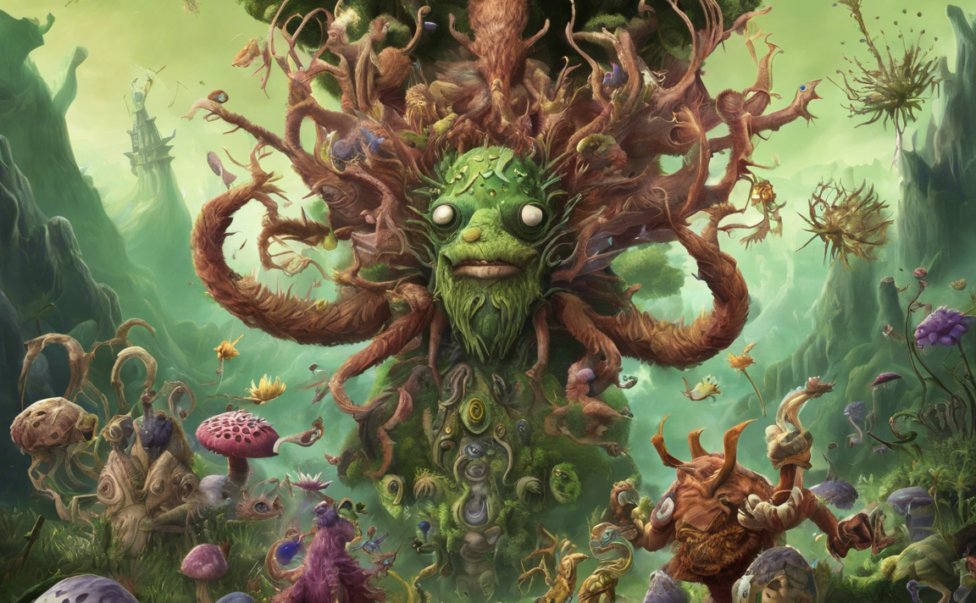The Lord of Spore: A Fungal Kingdom Tale
Introduction
In the vast and intricate world of fungi, there exists a diverse and fascinating group of organisms known as “The Lord of Spore: A Fungal Kingdom Tale”. Fungi play a critical role in various ecosystems, contributing to nutrient recycling, decomposition, and even symbiotic relationships with plants. In this article, we will delve into the captivating world of fungi, exploring their unique characteristics, ecological importance, and the role they play in human society.
The Kingdom of Fungi
Fungi belong to their own distinct kingdom, separate from plants, animals, and bacteria. They are eukaryotic organisms, meaning their cells have a nucleus enclosed within membranes. Fungi are incredibly diverse, with over 144,000 species identified and potentially millions more yet to be discovered. They can be found in almost every environment on Earth, from the depths of the ocean to the tops of mountains.
Characteristics of Fungi
Fungi come in various shapes and sizes, from microscopic single-celled yeasts to large and complex mushrooms. Despite their diversity, fungi share some common characteristics:
-
Heterotrophic Nutrition: Fungi are unable to produce their own food through photosynthesis, so they obtain nutrients by secreting enzymes that break down organic matter in their surroundings.
-
Cell Wall Composition: The cell walls of fungi are made up of chitin, a tough and flexible polysaccharide that provides structural support.
-
Reproductive Structures: Fungi reproduce through the production of spores, which can be dispersed by wind, water, or even animals. These spores give rise to new fungal colonies under favorable conditions.
-
Mycelium: The main body of a fungus is called the mycelium, which consists of a network of thread-like structures called hyphae. The mycelium serves as the primary feeding and growing structure of the fungus.
Ecological Importance of Fungi
Fungi play crucial roles in ecosystems around the world, serving as decomposers, symbionts, and even pathogens. Some key ecological functions of fungi include:
-
Decomposition: Fungi are nature’s recyclers, breaking down dead organic matter and returning essential nutrients to the soil. Without fungi, organic material would accumulate, and nutrient cycling would be disrupted.
-
Mycorrhizal Relationships: Many plants form mutually beneficial relationships with fungi known as mycorrhizae. Fungi help plants absorb water and nutrients from the soil, while plants provide sugars and carbohydrates to the fungi.
-
Endophytic Associations: Some fungi live inside plant tissues without causing harm, offering protection against pathogens and environmental stressors. Endophytic fungi can enhance plant growth and resilience.
-
Predation and Parasitism: While some fungi form beneficial relationships with other organisms, others act as predators or parasites. These fungi help control populations of insects, nematodes, and other pests in various ecosystems.
Fungi and Human Society
Beyond their ecological importance, fungi play significant roles in human society as well. From culinary delights to life-saving medicines, fungi have a profound impact on various aspects of human life:
-
Food Production: Mushrooms, yeasts, and molds are essential in the culinary world, adding flavors, textures, and nutrients to a wide range of dishes. Fermented foods like cheese, bread, and beer owe their unique properties to fungi.
-
Medicinal Uses: Fungi have long been used in traditional medicine practices and continue to provide valuable compounds for modern healthcare. Antibiotics like penicillin, immunosuppressants, and anti-cancer drugs are derived from fungal sources.
-
Bioremediation: Some fungi have the remarkable ability to break down environmental pollutants and detoxify contaminated sites through a process known as bioremediation. Fungi are being explored for their potential in cleaning up oil spills, pesticides, and heavy metals.
-
Industrial Applications: Fungi are used in various industrial processes, including the production of enzymes, biofuels, and biodegradable plastics. Their ability to degrade complex organic compounds makes them valuable tools in biotechnology.
Frequently Asked Questions (FAQs)
-
Q: Are all fungi harmful to humans?
A: No, while some fungi can be harmful and cause diseases in humans, the majority of fungi are harmless and play essential roles in ecosystems. -
Q: Can fungi be used to address food insecurity?
A: Yes, fungi like yeasts and mushrooms are valuable sources of nutrition and can be cultivated to address food shortages in certain regions. -
Q: What is mycorrhizal fungi, and why are they important for plant growth?
A: Mycorrhizal fungi form symbiotic relationships with plants, assisting in nutrient uptake and enhancing plant growth and resilience. -
Q: How are fungi different from plants and animals?
A: Fungi are more closely related to animals than plants and obtain nutrients through absorption rather than photosynthesis. -
Q: Can fungi be used for sustainable agriculture practices?
A: Yes, fungi play vital roles in soil health, nutrient cycling, and pest control, making them valuable allies in sustainable agriculture.
Conclusion
The world of fungi is complex, diverse, and full of wonders waiting to be discovered. From their ecological significance to their myriad uses in human society, fungi continue to fascinate and inspire researchers, conservationists, chefs, and healthcare professionals alike. By understanding and appreciating the contributions of fungi, we can forge a deeper connection with the natural world and unlock the vast potential they hold for a sustainable future.

